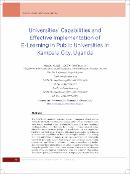| dc.contributor.author | Wilson, Mugizi | |
| dc.contributor.author | Joseph, Rwothumio | |
| dc.date.accessioned | 2023-12-19T13:41:44Z | |
| dc.date.available | 2023-12-19T13:41:44Z | |
| dc.date.issued | 2023-02 | |
| dc.identifier.citation | MUGIZI, W., & RWOTHUMIO, J. (2023). Universities’ Capabilities and Effective Implementation of E-Learning in Public Universities in Kampala City, Uganda. Journal of the National Council for Higher Education Vol, 10(2), 68. | en_US |
| dc.identifier.uri | https://doi.org/10.58653/nche.v10i2.04 | |
| dc.identifier.uri | https://hdl.handle.net/20.500.12504/1535 | |
| dc.description.abstract | The COVID-19 pandemic restricted access to campuses of universities
owing to intermittent lockdowns. Consequently, educational institutions
were forced to adopt virtual teaching techniques to ensure continued
teaching and learning. However, the effective implementation of online
education in universities in Uganda faced capability challenges that
hindered its effectiveness. Therefore, this study investigated the influence
of universities’ capabilities on the effective implementation of e-learning
in public universities in Kampala City, Uganda during and beyond the
COVID-19 pandemic period. Anchoring in resource-based theory (RBT),
universities’ capabilities for effective implementation e-learning studied
included experimentation, integration capability, and content management.
Using the quantitative approach, cross-sectional data was collected from a
sample of 312 academic staff from Kyambogo and Makerere Universities,
the only two public universities located in Kampala City, Uganda. Data wascollected using a self-administered questionnaire. The data was analysed
using descriptive and inferential statistics. Descriptive statistics involved
the calculation of means while inferential analysis involved structural
equation models (SEM) using SmartPLS. The results revealed that content
management and integration capability positively and significantly predicted
e-learning implementation. However, experimentation negatively and
insignificantly predicted e-learning implementation. The study concluded
that content management and integration capability are vital for e-learning
implementation. Nonetheless, experimentation is not a probable requirement
for the effective implementation of e-learning. Therefore , it was recommended
that university managers should develop integration capabilities, and should
support lecturers to improve their content management, but experimentation
should not be prioritised in the implementation of e-learning. | en_US |
| dc.language.iso | en | en_US |
| dc.publisher | Journal of the National Council for Higher Education | en_US |
| dc.subject | Capabilities | en_US |
| dc.subject | E-learning | en_US |
| dc.subject | Experimentation | en_US |
| dc.subject | Integration | en_US |
| dc.subject | RBT | en_US |
| dc.title | Universities’ capabilities and effective implementation of e-learning in public universities in Kampala city, Uganda | en_US |
| dc.type | Article | en_US |

